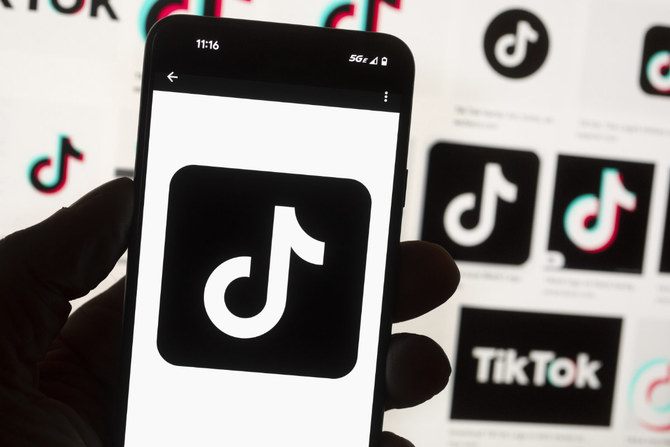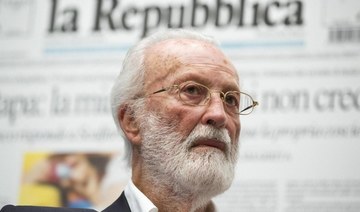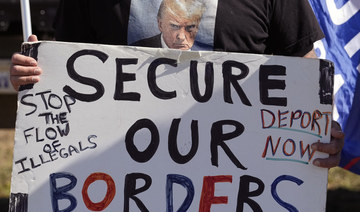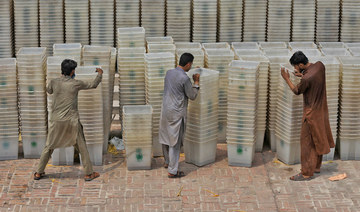LONDON: Terry Anderson, a US journalist who was held captive by Islamist militants for almost seven years in Lebanon and came to symbolize the plight of Western hostages during the country’s 1975-1990 civil war, died on Sunday at age 76, his daughter said in a statement.
The former chief Middle East correspondent for The Associated Press, who was the longest held hostage of the scores of Westerners abducted in Lebanon, died at his home in Greenwood Lake, New York, said his daughter Sulome Anderson, who was born three months after he was seized. No cause of death was given.
Kept in barely-lit cells by mostly Shiite Muslim groups in what was known as The Hostage Crisis, and chained by his hands and feet and blindfolded much of the time, the former Marine later recalled that he “almost went insane” and that only his Roman Catholic faith prevented him from taking his life before he was freed in December 1991.
“Though my father’s life was marked by extreme suffering during his time as a hostage in captivity, he found a quiet, comfortable peace in recent years. I know he would choose to be remembered not by his very worst experience, but through his humanitarian work with the Vietnam Children’s Fund, the Committee to Protect Journalists, homeless veterans and many other incredible causes,” Sulome Anderson said.
The family will take some time to organize a memorial, she said.
Anderson’s ordeal began in Beirut on the morning of March 16, 1985, after he played a round of tennis. A green Mercedes sedan with curtains over the rear window pulled up, three gunmen jumped out and dragged Anderson, still dressed in shorts, into the car.
The pro-Iran Islamic Jihad group claimed responsibility for the kidnapping, saying it was part of “continuing operations against Americans.” The abductors demanded freedom for Shiite Muslims jailed in Kuwait for bomb attacks against the US and French embassies there.
It was the start of a nightmare for Anderson that would last six years and nine months during which he was stuck in cells under the rubble-strewn streets of Beirut and elsewhere, often badly fed and sleeping on a thin, dirty mattress on a concrete floor.
During captivity, both his father and brother would die of cancer and he would not see his daughter Sulome until she was six years old.
“What kept me going?” he asked aloud shortly after release. “My companions. I was lucky to have people with me most of the time. My faith, stubbornness. You do what you have to. You wake up every day, summon up the energy from somewhere. You think you haven’t got it and you get through the day and you do it. Day after day after day.”
Other hostages described Anderson as tough and active in captivity, learning French and Arabic and exercising regularly.
However, they also told of him banging his head against a wall until he bled in frustration at beatings, isolation, false hopes and the feeling of being neglected by the outside world.
“There is a limit of how long we can last and some of us are approaching the limit very badly,” Anderson said in a videotape released by his captors in December 1987.
Marcel Fontaine, a French diplomat who was released in May 1988 after three years of captivity, recalled the time cell mate Anderson thought freedom was near because he was allowed to see the sun and eat a hamburger.
In April 1987 Anderson was given a suit of clothes that his captors had made for him. “He wore it every day,” Fontaine said.
A week later, however, Anderson’s captors took the suit back, leaving him in despair and certain he was forgotten, Fontaine said.
Scores of journalist groups, governments and individuals over the years called for Anderson’s release and his Oct. 27 birthday became an unofficial US memorial day for hostages.
Anderson said he considered killing himself several times but rejected it. He relied heavily on his faith, which he said he had renewed six months before being kidnapped.
“I must have read the Bible 50 times from start to finish,” he said. “It was an enormous help to me.”
His sister, Peggy Say, who died in 2015, was his fiercest advocate during captivity.
She worked tirelessly for her brother’s freedom. She visited Arab and European capitals, lobbied the Pope, the Archbishop of Canterbury and every US official and politician available.
Under pressure from the media and the US hostages’ families, the Reagan administration negotiated a secret and illegal deal in the mid-1980s to facilitate arms sales to Iran in return for the release of American hostages. But the deal, known as the Iran–Contra affair, failed to gain freedom for any of the hostages.
Born Oct. 27, 1947, in Lorain, Ohio, Anderson grew up in Batavia, New York. He graduated from Iowa State University and spent six years in the Marine Corps, mostly as a journalist.
He worked for the AP in Detroit, Louisville, New York, Tokyo, Johannesburg and then Beirut, where he first went to cover the Israeli invasion in 1982.
In that war-torn city, he fell in love with Lebanese woman Madeleine Bassil, who was his fiance and pregnant with their daughter Sulome when he was snatched.
He is survived by his daughters Sulome and Gabrielle, his sister Judy and brother Jack, and by Bassil, whom Sulome Anderson called “his ex-wife and best friend.”
Anderson and fellow hostages developed a system of communication by tapping on walls between their cells. Always the journalist, Anderson passed on news of the outside world he had picked up during captivity to Church of England envoy Terry Waite, being held hostage in an adjacent room in September 1990 after years of solitary confinement.
“Then the world news: the Berlin Wall’s falling, communism’s demise in eastern Europe, free elections in the Soviet Union, work toward multiracial government in South Africa. All the incredible things that have happened since he was taken nearly three years ago. He thought I was crazy,” Anderson wrote in his 1993 book “Den of Lions.”
After his release, Anderson taught journalism at Columbia University in New York, Ohio University, the University of Kentucky and the University of Florida until he retired in 2015.
Among businesses he invested in were a horse ranch in Ohio, and a restaurant. He unsuccessfully ran for the Ohio state Senate as a Democrat in 2004 and sued Iran in federal court for his abduction, winning a multimillion-dollar settlement in 2002.
Terry Anderson, US journalist held hostage nearly 7 years in Lebanon, dead at 76
https://arab.news/wjp2q
Terry Anderson, US journalist held hostage nearly 7 years in Lebanon, dead at 76

- Former AP correspondent was abuducted by pro-Iran Shiite Muslim group as part of “continuing operations against Americans”
Warren Buffett says AI may be better for scammers than society. And he’s seen how

- The billionaire investing guru predicted scammers will seize on the technology, and may do more harm with it than society can wring good
OMAHA, Nebraska: Warren Buffett cautioned the tens of thousands of shareholders who packed an arena for his annual meeting that artificial intelligence scams could become “the growth industry of all time.”
Doubling down on his cautionary words from last year, Buffett told the throngs he recently came face to face with the downside of AI. And it looked and sounded just like him. Someone made a fake video of Buffett, apparently convincing enough that the so-called Oracle of Omaha himself said he could imagine it tricking him into sending money overseas.
The billionaire investing guru predicted scammers will seize on the technology, and may do more harm with it than society can wring good.
“As someone who doesn’t understand a damn thing about it, it has enormous potential for good and enormous potential for harm and I just don’t know how that plays out,” he said.
EARNINGS BEFORE MUSINGS
The day started early Saturday with Berkshire Hathaway announcing a steep drop in earnings as the paper value of its investments plummeted and it pared its Apple holdings. The company reported a $12.7 billion profit, or $8.825 per Class A share, in first the quarter, down 64 percent from $35.5 billion, or $24,377 per A share a year ago.
But Buffett encourages investors to pay more attention to the conglomerate’s operating earnings from the companies it actually owns. Those jumped 39 percent to $11.222 billion, or $7,796.47 per Class A share, led by insurance companies’ performance.
None of it that got in the way of the fun.
Throngs flooded the arena to buy up Squishmallows of Buffett and former Vice Chairman Charlie Munger, who died last fall. The event attracts investors from all over the world and is unlike any other company meeting. Those attending for the first time are driven by an urgency to get here while the 93-year-old Buffett is still alive.
“This is one of the best events in the world to learn about investing. To learn from the gods of the industry,” said Akshay Bhansali, who spent the better part of two days traveling from India to Omaha.
A NOTABLE ABSENCE
Devotees come from all over the world to vacuum up tidbits of wisdom from Buffett, who famously dubbed the meeting ‘Woodstock for Capitalists.’
But a key ingredient was missing this year: It was the first meeting since Munger died.
The meeting opened with a video tribute highlighting some of his best known quotes, including classic lines like “If people weren’t so often wrong, we wouldn’t be so rich.” The video also featured skits the investors made with Hollywood stars over the years, including a “Desperate Housewives” spoof where one of the women introduced Munger as her boyfriend and another in which actress Jaimie Lee Curtis swooned over him.
As the video ended, the arena erupted in a prolonged standing ovation honoring Munger, whom Buffett called “the architect of Berkshire Hathaway.”
Buffett said Munger remained curious about the world up until the end of his life at 99, hosting dinner parties, meeting with people and holding regular Zoom calls.
“Like his hero Ben Franklin, Charlie wanted to understand everything,” Buffett said.
For decades, Munger and Buffett functioned as a classic comedy duo, with Buffett offering lengthy setups to Munger’s witty one-liners. He once referred to unproven Internet companies as “turds.”
Together, the pair transformed Berkshire from a floundering textile mill into a massive conglomerate made up of a variety of interests, from insurance companies such as Geico to BNSF railroad to several major utilities and an assortment of other companies.
Munger often summed up the key Berkshire’s success as “trying to be consistently not stupid, instead of trying to be very intelligent.” He and Buffett also were known for sticking to businesses they understood well.
“Warren always did at least 80 percent of the talking. But Charlie was a great foil,” said Stansberry Research analyst Whitney Tilson, who was looking forward to his 27th consecutive meeting.
NEXT GEN LEADERS
Munger’s absence, however, created space for shareholders to get to know better the two executives who directly oversee Berkshire’s companies: Ajit Jain, who manages the insurance units; and Abel, who handles everything else and has been named Buffett’s successor. The two shared the main stage with Buffett this year.
The first time Buffett kicked a question to Abel, he mistakenly said “Charlie?” Abel shrugged off the mistake and dove into the challenges utilities face from the increased risk of wildfires and some regulators’ reluctance to let them collect a reasonable profit.
Morningstar analyst Greggory Warren said he believes Abel spoke up more Saturday and let shareholders see some of the brilliance Berkshire executives talk about.
“Greg’s a rock star,” said Chris Bloomstran, president of Semper Augustus Investments Group. “The bench is deep. He won’t have the same humor at the meeting. But I think we all come here to get a reminder every year to be rational.”
A LOOK TO THE FUTURE
Buffett has made clear that Abel will be Berkshire’s next CEO, but he said Saturday that he had changed his opinion on how the company’s investment portfolio should be handled. He had previously said it would fall to two investment managers who handle small chunks of the portfolio now. On Saturday, Buffett endorsed Abel for the gig, as well as overseeing the operating businesses and any acquisitions.
“He understands businesses extremely well. and if you understand businesses, you understand common stocks,” Buffett said. Ultimately, it will be up to the board to decide, but the billionaire said he might come back and haunt them if they try to do it differently.
Overall, Buffett said Berkshire’s system of having all the noninsurance companies report to Abel and the insurers report to Jain is working well. He himself hardly gets any calls from managers anymore because they get more guidance from Abel and Jain.
“This place would work extremely well the next day if something happened to me,” Buffett said.
Nevertheless, the best applause line of the day was Buffett’s closing remark: “I not only hope that you come next year but I hope that I come next year.”
Lebanese security forces arrest ‘TikTok influencer’ using platform to lure, assault minors

- Lebanese police say they arrested six, including three minors, involved in sexual assaults against minors
LONDON: Lebanese authorities arrested on Wednesday six people for their alleged involvement in sexual assaults on children, sometimes using the video-sharing platform TikTok to lure minors.
The Internal Security Forces said in a statement that among those arrested was a “TikTok influencer,” who is also a hairdresser, according to local media.
The six suspects are reportedly part of a criminal network comprising around 30 individuals involved in assaults against at least 30 children.
The Lebanese police said in a statement that “based on information obtained by the Cybercrime Bureau of the Judicial Police, and following a complaint lodged by a number of minors with the Public Prosecutor’s Office concerning sexual assaults, compromising photos and incitement to take drugs by members of a gang, the bureau in question has been able to arrest, to date, six people in Beirut, Mount Lebanon and North Lebanon.”
The arrested suspects also include three minors of Lebanese, Turkish, and Syrian nationalities who were active on TikTok, according to the statement.
Highlighting that the case has been probed for about a month, the Lebanese police vowed that “the investigation is continuing with a view to arresting all members of the gang.”
The head of the network, a famous TikTok personality, purportedly abused his fame and invited children to shoot TikTok videos with him, the independent Lebanese TV channel Al-Jadeed reported.
The TikToker would cut the children’s hair to gain their trust before inviting them to a party, where his accomplices sexually assaulted the children.
Violence against environmental journalists rises: Report

- State actors repsonsible for the attacks in most cases, says UNESCO
SANTIAGO: Journalists who report on environmental issues face increasing violence around the world from both state and private actors, UNESCO said on Thursday, highlighting that 44 of these journalists have been murdered between 2009 and 2023.
More than 70 percent of the 905 journalists the agency surveyed in 129 countries said they had been attacked, threatened or pressured, and that the violence against them had worsened — with 305 attacks reported in the last five years alone.
UNESCO, the UN cultural agency, listed in its report physical attacks such as injuries, arrests and harassment, as well as legal actions, including defamation lawsuits and criminal proceedings, among others.
At least 749 journalists, groups of journalists and media outlets have been attacked in 89 countries across all regions, its report said, with state actors being responsible for at least half and private for at least a quarter.
“State actors — police, military forces, government officials and employees, local authorities — are responsible for most of the attacks for which perpetrator information is available,” the report said.
These journalists were covering a wide range of topics, including protests, mining and land conflicts, logging and deforestation, extreme weather events, pollution and environmental damage, and the fossil fuel industry.
Men were more frequently attacked in general and women more frequently digitally, the report said.
Of the 44 journalists that were murdered in 15 countries while reporting on environmental issues, the report said only five cases resulted in convictions. Perpetrators remain unidentified in 19 of the 44 murders.
At least 24 journalists survived murder attempts.
UNESCO awards press prize to Palestinian journalists in Gaza

- UN director says prize is tribute to their courage
PARIS: UNESCO on Thursday awarded its world press freedom prize to all Palestinian journalists covering the war in Gaza, where Israel has been battling Hamas for more than six months.
“In these times of darkness and hopelessness, we wish to share a strong message of solidarity and recognition to those Palestinian journalists who are covering this crisis in such dramatic circumstances,” said Mauricio Weibel, chair of the international jury of media professionals.
“As humanity, we have a huge debt to their courage and commitment to freedom of expression.”
Audrey Azoulay, director general at the UN organization for education, science and culture, said the prize paid “tribute to the courage of journalists facing difficult and dangerous circumstances.”
According to the New York-based Committee to Protect Journalists (CPJ), at least 97 members of the press have been killed since the war broke out in October, 92 of whom were Palestinians.
The war started with Hamas’s unprecedented October 7 attack on Israel that resulted in the deaths of 1,170 people, mostly civilians, according to an AFP tally of Israeli official figures.
Israel estimates that 129 captives seized by militants during their attack remain in Gaza. The military says 34 of them are dead.
Israel’s retaliatory offensive against Hamas has killed at least 34,596 people in Gaza, mostly women and children, according to the Hamas-run territory’s health ministry.
Russian state media is posting more on TikTok ahead of the US presidential election, study says

- State-linked accounts are also active on other social media platforms and have a larger presence on Telegram and X than on TikTok, says Brookings Institution report
- The report comes after Biden last month signed legislation forcing TikTok’s parent company — China-based ByteDance — to sell the platform or face a ban in the US
Russian state-affiliated accounts have boosted their use of TikTok and are getting more engagement on the short-form video platform ahead of the US presidential election, according to a study published Thursday by the nonprofit Brookings Institution.
The report states that Russia is increasingly leveraging TikTok to disseminate Kremlin messages in both English and Spanish, with state-linked accounts posting far more frequently on the platform than they did two years ago.
Such accounts are also active on other social media platforms and have a larger presence on Telegram and X than on TikTok. However, the report says user engagement — such as likes, views and shares — on their posts has been much higher on TikTok than on either Telegram or X.
“The use of TikTok highlights a growing, but still not fully realized, avenue for Russia’s state-backed information apparatus to reach new, young audiences,” reads the report, which drew data from 70 different state-affiliated accounts and was authored by Valerie Wirtschafter, a Brookings fellow in foreign policy and its artificial intelligence initiative.
The study notes that most posts do not focus on US politics but other issues, like the war in Ukraine and NATO. However, those that do tend to feature more divisive topics like US policy on Israel and Russia, and questions around President Joe Biden’s age, the Brookings report says.
A TikTok spokesperson said the company has removed covert influence operations in the past and eliminated accounts, including 13 networks operating from Russia.
The spokesperson said TikTok also labels state-controlled media accounts and will expand that policy in the coming weeks “to further address accounts that attempt to reach communities outside their home country on current global events and affairs.”
The Brookings report comes after Biden last month signed legislation forcing TikTok’s parent company — China-based ByteDance — to sell the platform or face a ban in the US. The potential ban is expected to face legal challenges.




















